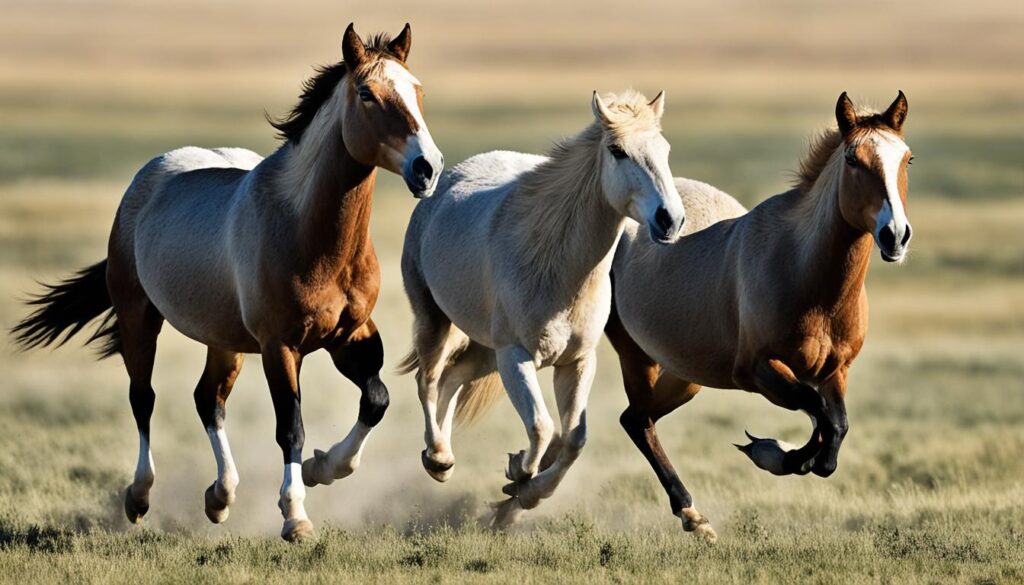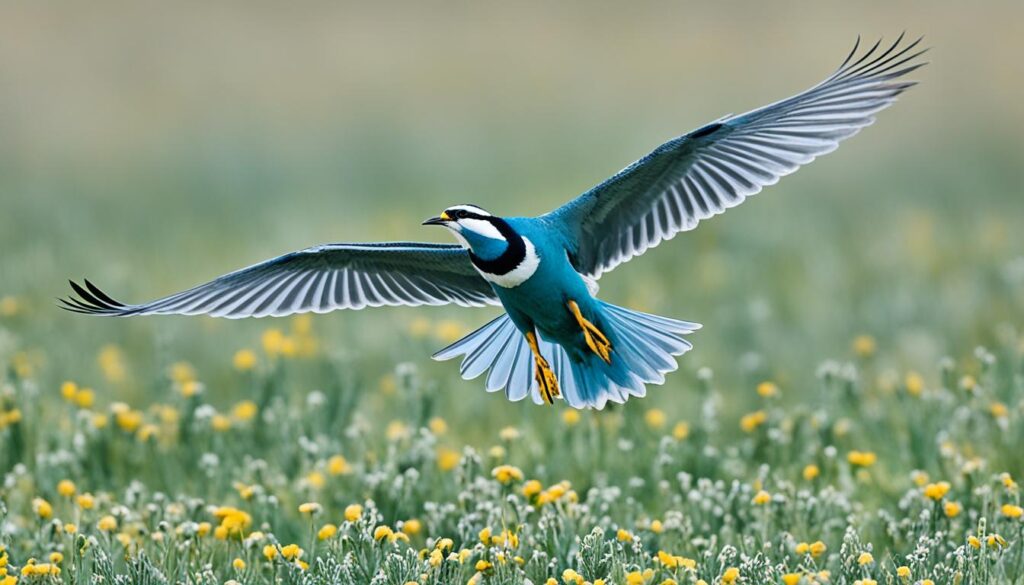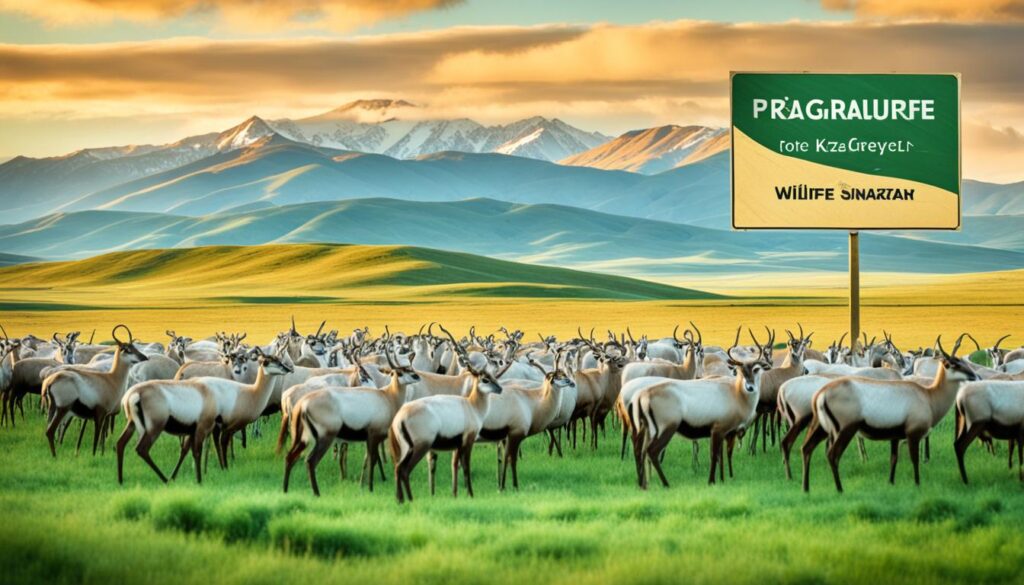Did you know that Kazakhstan is home to an astonishing variety of wildlife, encompassing a diverse range of flora, fauna, and fungi? Spanning across its vast landscapes, this country boasts an incredibly rich biodiversity that enthralls both nature enthusiasts and scientists alike. From unique mammals to captivating birds, the animals of Kazakhstan are a true testament to the country’s natural splendor.

Key Takeaways:
- Kazakhstan is known for its exceptional biodiversity, housing a wide array of animal species within its diverse ecosystems.
- The wildlife of Kazakhstan includes rare and endangered animals such as the saiga antelope, snow leopard, and golden eagle.
- Kazakhstan’s geographic features, such as steppes, deserts, mountains, and forests, provide varied habitats for a rich variety of animal species.
- The avifauna of Kazakhstan is particularly diverse, with over 500 species of birds recorded in the country.
- The nation has dedicated efforts to conserve its wildlife and biodiversity through the establishment of nature reserves and protected areas.
Fauna of Kazakhstan
The fauna of Kazakhstan is incredibly diverse, showcasing a rich variety of animal species that inhabit its vast landscapes. This section explores some of the remarkable creatures that call Kazakhstan home, including endangered and rare animals.
One of the iconic species found in Kazakhstan is the saiga antelope. This unique creature, known for its distinctive nose, roams the grasslands and steppe regions of Central Asia. Regrettably, saiga antelope populations have significantly declined due to habitat loss and poaching, making them an endangered species in Kazakhstan.
In the mountainous regions of Kazakhstan, the elusive snow leopard gracefully prowls through its rocky domain. This magnificent big cat, known for its adaptations to high altitudes, is considered a critically endangered species. Efforts to protect the snow leopard and its habitat are crucial for its survival in Kazakhstan.
The golden eagle, renowned for its majestic beauty and impressive wingspan, is another notable bird of prey found in Kazakhstan. These eagles soar across the country’s diverse landscapes, from rugged mountains to open steppes. However, habitat loss and illegal hunting pose threats to the golden eagle population.
The Eurasian brown bear, lynx, and goitered gazelle are among the other fascinating animals that inhabit Kazakhstan. These species adapt to various environments, showcasing the country’s biodiversity and unique ecosystems.
| Endangered Species | Rare Species |
|---|---|
| Saiga Antelope | Golden Eagle |
| Snow Leopard | Eurasian Brown Bear |
| Lynx | |
| Goitered Gazelle |
In addition to terrestrial species, Kazakhstan is home to a diverse range of reptiles, including snakes and lizards. These cold-blooded creatures are well-adapted to the country’s diverse habitats, from desert regions to forested areas.
Notable Animal Species Found in Kazakhstan:
- Bactrian Camel
- Barbel
- Caspian Seal
- Gray Wolf
- Great Bustard
- Moose
The wildlife of Kazakhstan is a testament to the country’s commitment to biodiversity preservation. Efforts are underway to protect and conserve endangered and rare animal species through the establishment of nature reserves and wildlife sanctuaries.
Avifauna of Kazakhstan
Kazakhstan is a haven for bird enthusiasts, boasting a rich avifauna with over 500 species recorded in the country. From majestic raptors to vibrant songbirds, Kazakhstan’s diverse habitats provide a sanctuary for a wide array of bird species.
The Naurzum Reserve stands out as a prominent destination for birdwatching, renowned for its impressive variety and abundance of predatory and migratory birds. Within the reserve, visitors can spot magnificent Imperial eagles, agile Saker falcons, powerful Steppe eagles, and graceful Red-footed falcons soaring through the skies.
The picturesque lakes of Kazakhstan serve as vital nesting grounds and crucial stopover sites for numerous migratory bird species. These serene oases offer a temporary refuge during their long journeys. Here, birdwatchers have the opportunity to observe and appreciate the beauty of various migratory birds as they rest and feed before continuing their migration.
To fully experience the remarkable avian biodiversity of Kazakhstan, a visit to one of the country’s many wildlife sanctuaries is a must. These protected areas provide vital habitats for a multitude of bird species, ensuring their conservation and preservation for future generations.
Notable Bird Species of Kazakhstan
- Imperial Eagle
- Saker Falcon
- Steppe Eagle
- Red-footed Falcon
- Black Lark
- Pallas’s Sea Eagle
- White Pelican
- Great Snipe

This stunning image showcases the vibrant beauty of the avifauna found in Kazakhstan. It captures the essence of the country’s diverse bird species, highlighting their vibrant colors, majestic flight, and undeniable grace.
Conservation Efforts in Kazakhstan
Kazakhstan has been at the forefront of conservation efforts to safeguard its wildlife and protect the rich biodiversity found within its borders. The country has taken significant steps towards establishing and maintaining wildlife sanctuaries and protected areas, ensuring the preservation of vulnerable species and their habitats.
One prominent example is the Altyn-Emel National Park, located in southeastern Kazakhstan. This expansive protected area spans over 460,000 hectares and is home to a diverse range of flora and fauna. The park serves as a sanctuary for endangered species like the snow leopard and the golden eagle, providing them with a safe haven to thrive and reproduce.

Another notable nature reserve is the Aksu-Zhabagly Nature Reserve, established in 1926 and recognized as the oldest and largest nature reserve in Central Asia. Situated in the western Tien Shan Mountains, this protected area protects endemic and rare plant species and provides critical habitats for a variety of wildlife, including the Tien Shan brown bear and the Turkmenian deer.
These wildlife sanctuaries serve as important centers for research, education, and conservation programs. In addition to their conservation efforts, Kazakhstan has also collaborated with international organizations and wildlife experts to introduce sustainable practices and raise awareness about the importance of biodiversity preservation.
Through guided wildlife tours led by experts, visitors have the opportunity to witness Kazakhstan’s diverse wildlife up close while learning about conservation efforts and the importance of preserving fragile ecosystems. These tours not only provide a unique experience for nature enthusiasts but also contribute to funding conservation initiatives.
In conclusion, Kazakhstan’s dedication to conservation efforts and the establishment of wildlife sanctuaries showcases the country’s commitment to protecting its natural heritage. These initiatives not only help safeguard endangered species but also contribute to the preservation of biodiversity in Kazakhstan for generations to come.
Conclusion
Kazakhstan is a remarkable country that boasts a rich and diverse wildlife. Its unique geography, consisting of steppes, deserts, mountains, and forests, provides a wide range of habitats for a multitude of animal species. From the rare saiga antelope to the majestic snow leopard, Kazakhstan offers an incredible opportunity to observe and appreciate the wonders of its wildlife.
However, with this biodiversity comes the responsibility to protect and preserve it. Kazakhstan has taken proactive steps to conserve its natural heritage through the establishment of protected areas and nature reserves. These efforts have been crucial in safeguarding endangered species and ensuring their survival in the face of various threats.
By prioritizing the conservation of its wildlife, Kazakhstan is not only preserving its natural treasures but also contributing to the global efforts to protect biodiversity. The country’s commitment to conservation is commendable and serves as an inspiration for other nations facing similar challenges.
As visitors and nature enthusiasts, it is our responsibility to promote sustainable tourism and respectful observation of these animals in their natural habitats. By doing so, we can contribute to the preservation of Kazakhstan’s wildlife and ensure that future generations can also experience the magnificence of its diverse animal species.
